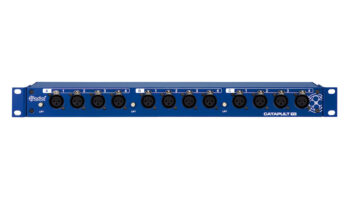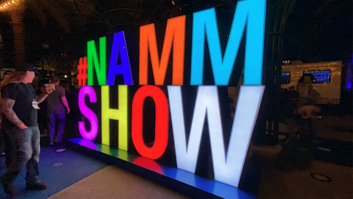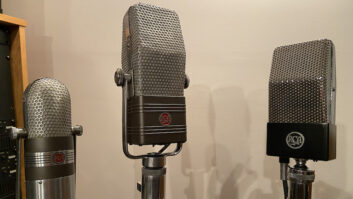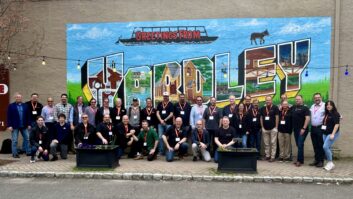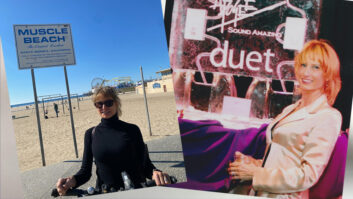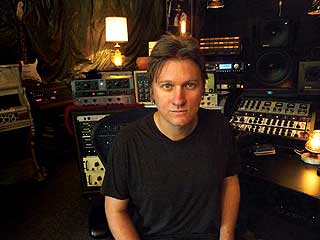
Joe Zook mixes artists including Modest Mouse, Dashboard Confessional and Pink in his 2010 Studio.
A recent addition to the A-list of mix engineers, Joe Zook is on a roll, having scored chart-topping singles and albums with OneRepublic, Katy Perry and Modest Mouse, as well as artists all over the stylistic spectrum — including Tricky, Kelly Clarkson, Pink, The Hives, The Plebz, Marc Broussard, Mika, Liz Phair, Lindsay Lohan, Brian Ray and Butch Walker — and international mix gigs from Australia to Belgium.
Zook did some recording in 2009, primarily for OneRepublic’s second album, including a string date at Abbey Road that he’s still buzzed about. He also worked with OneRepublic leader and hit songwriter Ryan Tedder recording Leona Lewis, Kristinia DeBarge and Adam Lambert, and with Butch Walker on tracks for Weezer’s latest. Otherwise, he’s been mixing away at 2010 Mixing, his studio in Studio City, tucked away off Ventura Boulevard a few doors down from a locally popular breakfast joint.
I walk through the door expecting to see a big ol’ analog console dominating the room. Instead, he’s sitting in front of a Digidesign Command|8 and a Mac Pro, surrounded by stacks of new and vintage outboard gear and a Studer 24-track tape machine. So it appears that Zook does his magic outside the traditional lines and outside the box.
“When I moved in here,” he says, “I thought I would put in a console. Now, if you gave me a console, I would get it out of here — this is everything I want right now. At first it was a struggle, and it took a lot of practice-engineering and trial and error. But then, once I got it, this system expanded the possibilities so far beyond the console that I just won’t go back. Not only that, but I’ve had that little Command|8 for five-and-a-half years, and the first downtime I had on it was two weeks ago. It took me 15 minutes — just trashed the preferences and it was back up and running. I do the Pro Tools software updates and that’s it. It works perfectly, and I know it so I’m very fast on it. I have almost no limitations on it. I have a 32-channel passive analog summing system — that’s very important — but the control surface gets it done.”
His go-to gear choices include Collins tube compressors for electric guitars; CBS Audimax II tube compressors for acoustics, overheads and sometimes electrics; Chandler EMI stereo compressors and EMI Zener stereo limiter for drums and vocals; Gates Level Devil tube compressor/limiter; 1959 Blonder Tongue B9b graphic tube EQs and modified Blonder Tongue B9 EQ/filter of the same vintage for bass; Neve 2264x compressors for all of the above instruments; a JFL Audio MP F6E, Vac Rac tube limiters and EQs on pianos and background vocals; Compex 760 for drums; Blue Stripe 1176 for vocals; SPL Transient Designers; Crane Song STC-8; SSL E Series compressors and EQs; Cinema EQs for vocals; spring reverbs; a stack of Distressors; a few dozen guitar pedals; and miscellaneous esoteric pieces.
Zook got the gear bug while working for nearly two years with producer/mixer Jack Joseph Puig. “After you hear some of those rare pieces, you don’t just forget about them,” he says. The Boulder native came to L.A. in 1996, learning the ropes under Buddy Brundo at Conway before moving over to Sunset Sound and Sound Factory with Mitchell Froom and Tchad Blake, among others, then Ocean Way with JJP. He’s been on his own since 2002, and two years later opened his own place, where he works with an eclectic clientele, which recently included Dashboard Confessional, Pink, Kevin Rudolf, Kimberly Caldwell, Matt Wertz, Debi Nova, Peter Conway, Josh Hoge, Sara Bareilles and newcomer Ashlyne Huff. Next up is a project for edgy pop band the Plain White T’s.
He attributes the diversity of his work to “a wide range of taste in music. You’re not really supposed to like Top 40 hits if you really love music far outside the mainstream, but that’s how I’ve always been. Sgt. Pepper’s got me started when I was 4 or 5, and I listened to ABBA and AC/DC. I’ve always been into all different genres, and not just as, ‘Oh, that’s kinda cool’ — I love all those genres. I think people who do a specific kind of music can tell that I love it. I feel that energy with them, and they believe it because it’s true.”
Zook sees his primary job as interpreting and refining the work of an artist and producer — “completing the vision,” as he puts it. “There’s a dialog that happens just from throwing up the tracks,” he points out. “I don’t always talk to people about what they want for the mix, and some people refuse to have a conversation. They say, ‘Just do what you do.’ Oftentimes, I don’t need anyone to tell me anything because most of it is right there. It tells its own story, and you can hear what’s happening from the way someone’s playing or singing or breathing, and the spectrum of choices a producer made — sometimes there are plug-ins and they have automation going; sometimes it’s completely blank. All of it tells the story of how a project’s been going. Once you start, you just get in that world and go until it’s done.”
On average, Zook does a mix a day, listening back to the mix on Highway 101 North as he drives home to Woodland Hills. But you won’t find a stack of burned CD-Rs on the passenger’s seat. These days he loads all his work into his iPhone.
Before he gets back to work, Zook returns to the subject of methodology. “Today, there are so many ways to do it,” he says. “There’s people mixing on old Neves killin’ it, people working on brand-new SSLs killin’ it, people mixing in the box and killin’ it. Technology is a wide-open field now.” He swings back into position in front of his trusty Command|8. “I’ve got my hands on these knobs, and that’s all I want.”
Send L.A. news to Bud Scoppa at
[email protected].


